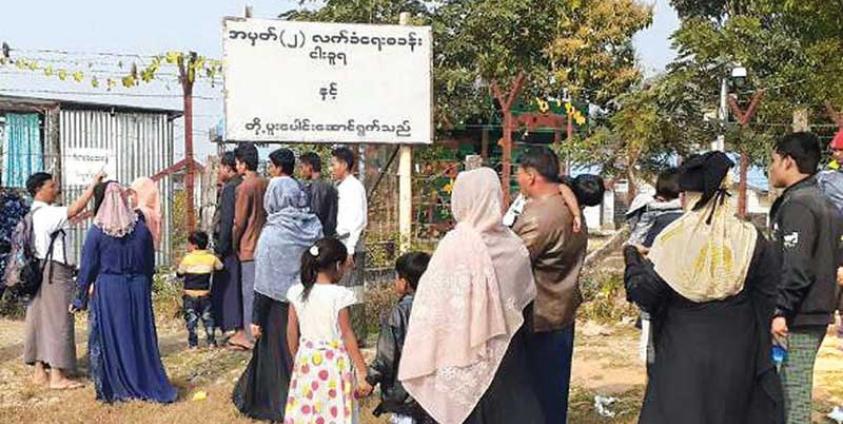Myanmar’s military regime has spent 5 billion kyats on efforts to repatriate Muslims from Bangladesh, according to junta media, which cited the regime’s Ministry of Border Affairs permanent secretary, U Thein Htay Oo.
The regime plans to take back around 1,500 Muslims in its pilot project, the March 23 issue of junta-controlled newspaper Myanma Alin reported.
The returnees will be received at transit camps in Taungpyo Letwe and Nga Khu Ya, before being accommodated at another transit camp in Hla Poe Kaung for around two months.
“We have prepared land plots in 15 villages in northern Maungdaw. There are farmlands in place near those villages for their livelihoods. We have made arrangements for their rehabilitation,” permanent secretary U Thein Htay of the junta’s Border Affairs Ministry was quoted by Myanma Alin as saying.
Arakan State social minister U Aung Myo, Maungdaw district administrator U Nay Oo and officials have been participating in the verification of Muslim refugees in Bangladesh’s Teknaf since March 15.
The regime also recently took diplomats from China, India and Thailand to Maungdaw and showed them its preparations for the repatriation of Muslims.
“We are working to improve buildings and roads and supply electricity and water as a priority. We are working systematically for the repatriation process,” junta-appointed Arakan State chief minister U Htein Lin was quoted as saying.
The report did not indicate what specifically the regime had spent 5 billion kyat on in relation to its repatriation efforts. DMG’s calls to Arakan State Administration Council spokesman U Hla Thein went unanswered.
A resident of Nga Khu Ya village in Maungdaw said: “Around 10 buildings have been built in Nga Khu Ya to shelter Muslim returnees. [The regime] is not repairing those buildings now. However, I saw them repairing crumbling buildings some four months ago.”
Muslim refugees in Bangladesh have said they would not return to Arakan State unless they are granted citizenship, assured safety and allowed to travel freely.
More than 700,000 Muslims fled to neighbouring Bangladesh when the Myanmar military carried out “clearance operations” following the Arakan Rohingya Salvation Army’s attacks on several police outposts in 2017.
The United Nations’ human rights chief at the time described the military’s actions as a “textbook example of ethnic cleansing,” while others in the international community have called it genocide, including Bangladesh’s former foreign minister and the US secretary of state.








